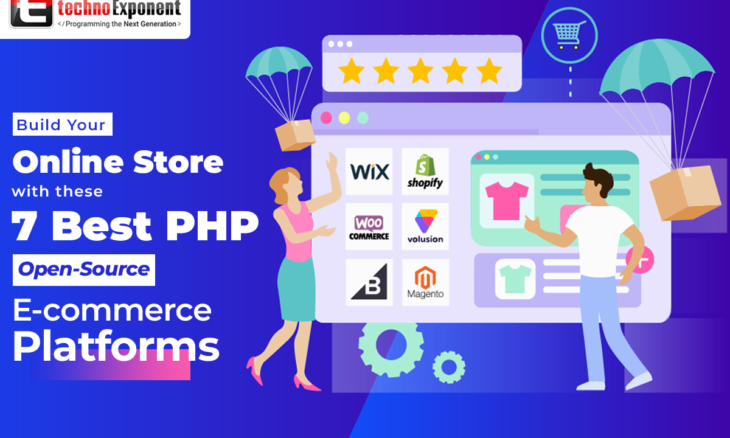
Introduction
Today, if you want to remain competitive, you need to have an online presence. Businesses of all sizes face difficulty if they are not present online. It is important to develop a solid strategy that encompasses many aspects of your business in order to launch an online business successfully. Specifically, you can work with an e-commerce management services provider to design your e-commerce solution. This blog throws light on the top 7 PHP open-source e-commerce platforms. Read the blog and choose the right platform that will work best for your organization.
Platforms for e-commerce: What You Need To Know?
Selecting an e-commerce platform is not an easy task. You need to consider several things. However, before choosing any one platform remember these priorities:
Maintenance and security
Pay attention to maintenance and security. Would you be able to manage these yourself if you had the technical capability? Are you able to hire someone to do it for you? How would you like things maintained and secured?
Platform’s cost
Can you afford its long-term and short-term plans? The cost of running an e-commerce store might increase significantly as your business grows, for instance, if you use SaaS solutions.
Features and Customization
Does the platform have the features and customizations you need? Do you want access to third-party tools if you are tied down to that platform? You should choose an e-commerce solution that’s easy to customize and can integrate with third-party tools if you want to use them.
7 best free and open-source e-commerce platforms
WooCommerce
One of the best free e-commerce platforms based on the PHP programming language is WooCommerce. It works as an extension of WordPress CMS. One can easily set up e-commerce plugins in just less than a few minutes and can even optimize top-notch ecommerce plugins for the best results.
Pros
- Highly scalable
- Draw and drag store builder
- Tons of paid and free plugin options are available.
Cons
- Technical help is required as your online store scales up.
Magento
It is one of the most trusted e-commerce platforms available for enterprises and individuals. A PHP-based e-commerce platform to help you easily build online businesses. With multiple extensions, the e-commerce store can easily integrate with third-party apps.
Pros
- Customizable and scalable platform
- The platform is open-source and has a large developer community.
Cons
- Requires a high budget for setting up the store
- Time-consuming and incompetent hosting solutions hinder stores’ scalability.
Drupal
Popular PHP open-source e-commerce solutions keep the payment receipts, and orders, in voice along with integration and payment options organized. While offering a complete administration system, it offers third-party integrations for fulfillment and accounting services.
Pros:
- Third-party integrations make a highly customizable platform.
- Can access marketing tools that boost online presence.
Cons
- Not suitable for beginners
Joomla
Creating an e-commerce store with PHP is another amazing solution. Your store can grow with the help of the platform’s inventory management tool and SEO services.
Pros
- It has a tight-knit developer community that’s ready to offer support whenever needed.
- Customizable, easy to use and can sell digital products on the Joomla stores.
Cons
- Beginners cannot use some useful plugins
- Plugins may need to be paid for sometimes
Bagisto
PHP’s Laravel framework powers Bagisto, an open-source e-commerce platform. In addition to offering basic to advanced e-commerce features, this platform is great for startups and small to medium businesses.
Pros
- Without the need to modify the database, any front-end technology stack can be used and customized as needed.
- A wide range of customizations and personalizations are available for both buyers and administrators to make the experience even better.
Cons
- No cons found till now.
Zencart
Using Zen Cart you can create an online store for free. Shopping cart software with a user-friendly interface that caters to merchant needs. You can start using it immediately after activating it, as it comes pre-defined with payment and shipping modules.
Pros:
- Friendly interface
- Managing products is very easy with Zen Cart
- Free and paid templates are available
Cons:
- Limited options for customizing and scaling the store
Yii2
Yii is an open-source Web programming framework (PHP) for developing Web applications of all kinds. Moreover, it supports sophisticated caching, making it suitable for developing large-scale applications such as forums, portals, content management systems (CMS), and e-commerce projects.
Pros
- Online stores can be developed using this platform.
- Easy to learn and convenient to make changes
Cons:
- There is a slow pace of updating this framework by its developers’
Conclusion
The top seven PHP open-source e-commerce platforms discussed above play a significant role in scaling the business. A platform’s suitability for your business cannot be determined without knowing its size, industry, and needs. The cost of advanced modules and extensions is not necessary if you want an online shop with basic features. On the other hand, if you want your website visitors to be surprised by your bright design and custom features, and you have enough budget, contacting a PHP development company is the best option.
 +44 141 628 8980
+44 141 628 8980
 (786) 269-2247
(786) 269-2247
 +61 872007153
+61 872007153
 +91 8900027268 (Sales only)
+91 8900027268 (Sales only)








